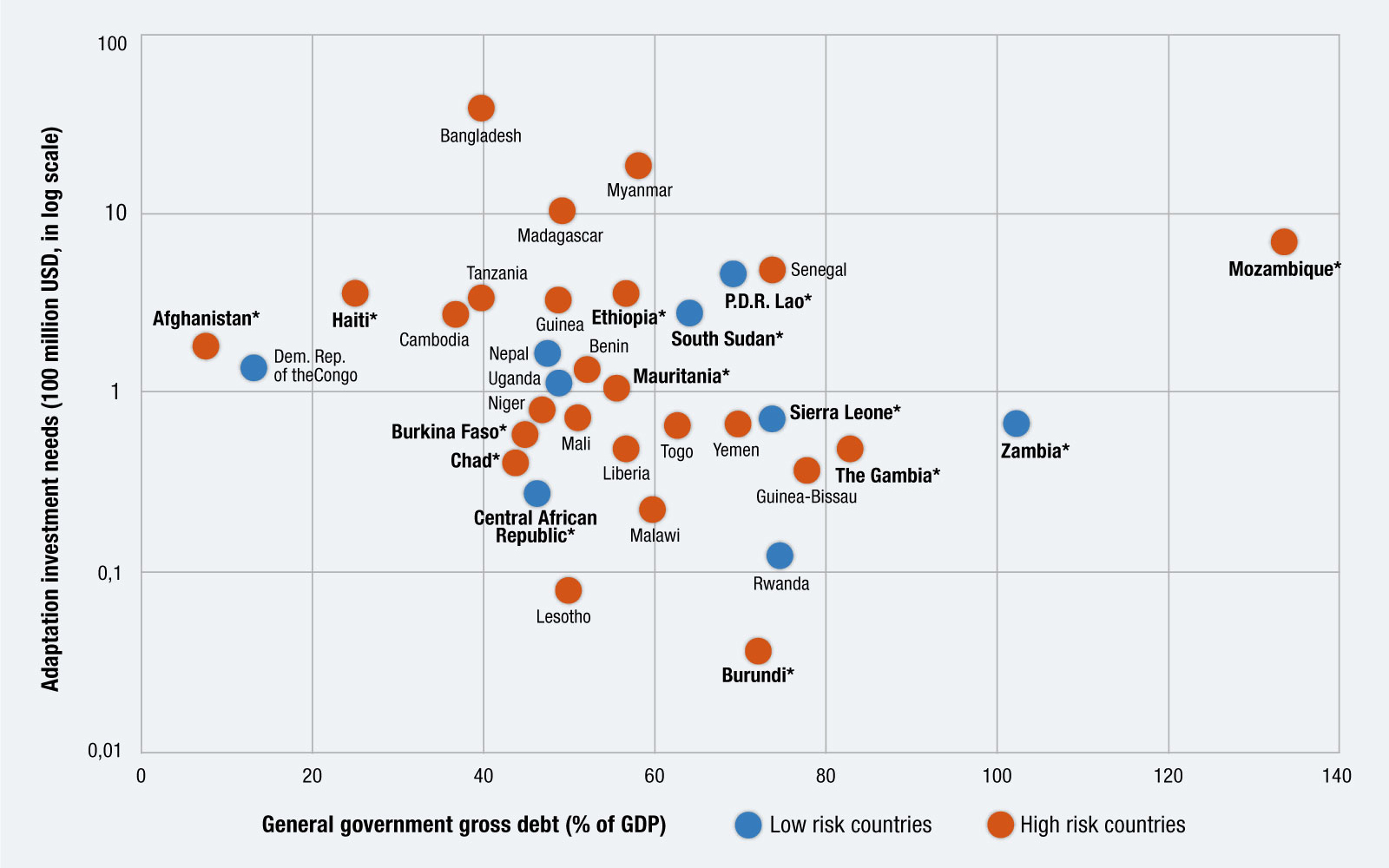LDC Graduation: Government's Commitment To Supporting Least Developed Countries

Table of Contents
Financial Support and Investment for Graduating LDCs
Successfully navigating the LDC graduation process necessitates robust financial backing that extends beyond the official graduation date. Governments must commit to providing sustained financial support to ensure these nations can consolidate their gains and continue their development trajectory.
Increased Aid and Development Assistance
Sustained financial support is crucial for post-graduation success. Graduating LDCs require a continued flow of resources to solidify their progress. This includes:
- Increased Official Development Assistance (ODA): A significant increase in ODA is essential, particularly targeted towards building resilient infrastructure, including transportation networks, energy grids, and communication systems. This investment lays the foundation for economic growth and improved living standards.
- Investment in Human Capital: Investing in human capital through education and healthcare is paramount. This involves increased funding for quality education at all levels, from primary to tertiary, as well as investments in healthcare infrastructure and programs to improve public health outcomes. A healthy and educated populace is the cornerstone of a thriving economy.
- Access to Concessional Loans and Grants: Providing access to concessional loans and grants for crucial development projects allows graduating LDCs to finance essential infrastructure and social programs without incurring unsustainable debt burdens. This ensures financial sustainability and long-term economic viability.
Private Sector Engagement and Investment
Attracting private sector investment is vital for sustainable economic growth. Governments can play a critical role in this process by:
- Creating a Stable Investment Climate: Establishing a transparent and predictable regulatory environment is key to attracting foreign direct investment (FDI). This includes simplifying bureaucratic processes, reducing corruption, and ensuring the rule of law.
- Developing Robust Infrastructure: Investing in robust infrastructure, including reliable energy, transportation, and communication systems, creates an attractive environment for private sector investment. This reduces business costs and increases productivity.
- Offering Incentives for FDI: Governments can offer targeted incentives, such as tax breaks, subsidies, and streamlined approval processes, to attract FDI in key sectors identified as crucial for economic diversification and growth.
Capacity Building and Institutional Strengthening
Building strong institutions and developing human capital are fundamental to successful LDC graduation and long-term development. Governments must prioritize these areas to ensure sustainable progress.
Strengthening Governance and Public Institutions
Effective governance is the bedrock of sustainable development. This involves:
- Promoting Good Governance: Implementing measures to promote transparency, accountability, and the rule of law is essential for building trust and attracting investment. This includes strengthening anti-corruption mechanisms and enhancing the efficiency of public institutions.
- Investing in Capacity Building: Providing training and development opportunities for public officials strengthens their skills and knowledge, enabling them to effectively manage public resources and implement development policies.
- Enhancing the Rule of Law: A strong and independent judiciary, coupled with effective law enforcement, is crucial for protecting property rights, fostering investment, and ensuring social stability.
Developing Human Capital
Investing in human capital is an investment in the future. This requires:
- Improving Access to Quality Education: Ensuring access to quality education at all levels, including technical and vocational training, empowers individuals and equips them with the skills needed for the modern workforce.
- Providing Skills Development Programs: Targeted skills development programs prepare individuals for specific job opportunities, enhancing their employability and contributing to economic growth.
- Strengthening Healthcare Systems: Improving healthcare systems improves the overall health and productivity of the workforce, reducing healthcare costs and boosting economic output.
Trade and Economic Diversification
Reducing reliance on a few commodities and diversifying the economy is essential for sustainable growth. Governments must actively promote trade and invest in economic diversification strategies.
Promoting Trade and Market Access
Increasing access to international markets is critical for economic growth. Governments can support this by:
- Negotiating Favorable Trade Agreements: Actively negotiating favorable trade agreements with developed countries reduces trade barriers and provides better access to international markets for LDC exports.
- Supporting Export Diversification: Investing in developing diverse export sectors reduces vulnerability to price fluctuations in a single commodity market.
- Investing in Trade Facilitation: Improving customs procedures, streamlining logistics, and reducing bureaucratic hurdles simplifies the process of exporting goods, making LDC products more competitive in the global market.
Economic Diversification Strategies
Moving beyond reliance on primary commodities requires a strategic shift towards value-added industries. This includes:
- Investment in Value-Added Industries: Investing in manufacturing, processing, and other value-added industries increases the economic value of exports and creates higher-paying jobs.
- Promoting Innovation and Technology: Encouraging innovation and technology adoption increases productivity, competitiveness, and creates new opportunities for growth.
- Supporting SMEs: Small and medium-sized enterprises (SMEs) are the backbone of many economies. Supporting their development through access to finance, training, and business development services fosters job creation and economic diversification.
Climate Change Resilience and Adaptation
LDCs are disproportionately vulnerable to the impacts of climate change. Governments must prioritize climate change resilience and adaptation measures.
Addressing Climate Change Vulnerabilities
Protecting vulnerable populations and infrastructure from the impacts of climate change is crucial. This requires:
- Investing in Climate Change Adaptation and Mitigation: Implementing measures to reduce greenhouse gas emissions and adapt to the unavoidable impacts of climate change protects livelihoods and infrastructure.
- Developing Early Warning Systems: Early warning systems for extreme weather events allow for timely evacuation and mitigation efforts, reducing the impact of natural disasters.
- Promoting Climate-Resilient Agriculture and Infrastructure: Investing in climate-resilient infrastructure and agriculture practices ensures continued food security and economic stability even in the face of climate change.
Access to Climate Finance
Securing access to international climate finance is crucial for implementing climate-resilient strategies. This requires:
- Strengthening National Climate Change Strategies: Developing comprehensive national climate change strategies and plans ensures that resources are allocated effectively and efficiently.
- Accessing Funds from the GCF and Other Sources: Actively seeking funding from the Green Climate Fund (GCF) and other international sources provides the necessary financial resources to implement climate change projects.
- Building Capacity to Manage Climate Finance: Building institutional capacity ensures that climate finance is used effectively and transparently, maximizing its impact.
Conclusion
Successful LDC graduation requires a comprehensive and sustained commitment from governments worldwide. By focusing on financial support, capacity building, trade diversification, and climate change resilience – all integral aspects of successful LDC graduation – we can help ensure these nations continue their journey towards sustainable development and prosperity. The global community must actively participate in supporting the post-graduation journey of these countries through continued partnership and strategic interventions in the realm of LDC Graduation. Let us work together to empower these nations and achieve the shared goal of sustainable development for all. The future of LDC graduation depends on our collective commitment to fostering a more equitable and prosperous world.

Featured Posts
-
 The Karate Kid Exploring Mr Miyagis Teachings And Their Impact
May 07, 2025
The Karate Kid Exploring Mr Miyagis Teachings And Their Impact
May 07, 2025 -
 Ashley Holders Exclusive Interview Donovan Mitchell On The Upcoming Playoffs
May 07, 2025
Ashley Holders Exclusive Interview Donovan Mitchell On The Upcoming Playoffs
May 07, 2025 -
 Cavaliers Mitchell And Mobley Dominate Knicks In 142 105 Rout
May 07, 2025
Cavaliers Mitchell And Mobley Dominate Knicks In 142 105 Rout
May 07, 2025 -
 Anthony Edwards Conversation With Barack Obama A Discussion Of Greatness
May 07, 2025
Anthony Edwards Conversation With Barack Obama A Discussion Of Greatness
May 07, 2025 -
 Review Of The Karate Kid Part Ii Thirty Years Later
May 07, 2025
Review Of The Karate Kid Part Ii Thirty Years Later
May 07, 2025
Latest Posts
-
 Investing In Xrp Ripple A Comprehensive Guide To Risks And Rewards
May 08, 2025
Investing In Xrp Ripple A Comprehensive Guide To Risks And Rewards
May 08, 2025 -
 Xrp Ripple Investment Strategy Maximizing Your Potential For Financial Success
May 08, 2025
Xrp Ripple Investment Strategy Maximizing Your Potential For Financial Success
May 08, 2025 -
 The Ripple Effect Assessing Xrps Potential For Long Term Growth And Financial Freedom
May 08, 2025
The Ripple Effect Assessing Xrps Potential For Long Term Growth And Financial Freedom
May 08, 2025 -
 Understanding Xrp Ripple Is It A Viable Investment For Your Future
May 08, 2025
Understanding Xrp Ripple Is It A Viable Investment For Your Future
May 08, 2025 -
 Ripple Xrp Rally Analysis And 3 40 Price Target
May 08, 2025
Ripple Xrp Rally Analysis And 3 40 Price Target
May 08, 2025
